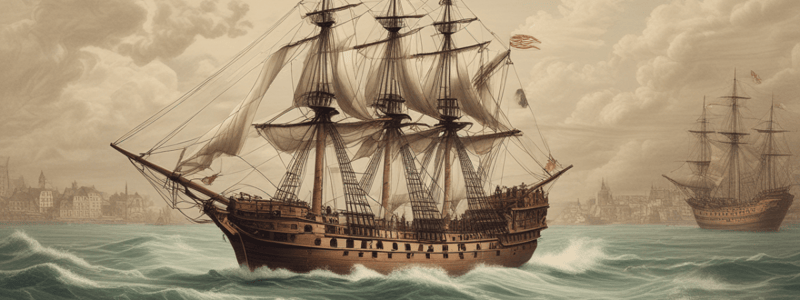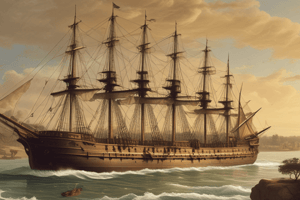Podcast
Questions and Answers
What was the value of American exports in 1790?
What was the value of American exports in 1790?
- $10.2 million
- $40.2 million
- $20.2 million (correct)
- $30.2 million
What was the main obstacle to substantial economic development within the United States during the early 19th century?
What was the main obstacle to substantial economic development within the United States during the early 19th century?
- Exorbitant internal transportation costs (correct)
- Limited access to European markets
- High taxation
- Shortage of labor
How much did it cost to move one ton of goods thirty miles across land in 1816?
How much did it cost to move one ton of goods thirty miles across land in 1816?
- $3
- $15
- $9 (correct)
- $5
What was the main reason for the increase in American exports during the French Revolutionary Wars?
What was the main reason for the increase in American exports during the French Revolutionary Wars?
What was the average annual expenditure of the federal government on internal improvements during Andrew Jackson's presidency?
What was the average annual expenditure of the federal government on internal improvements during Andrew Jackson's presidency?
Who emphasized the importance of establishing roads and canals in his 1815 annual message to Congress?
Who emphasized the importance of establishing roads and canals in his 1815 annual message to Congress?
What was the value of American exports by 1807?
What was the value of American exports by 1807?
Which of the following best describes the role of state governments during the early 19th century?
Which of the following best describes the role of state governments during the early 19th century?
What was the approximate distance of Margaret Dwight's journey from New Haven to Ohio Territory in 1810?
What was the approximate distance of Margaret Dwight's journey from New Haven to Ohio Territory in 1810?
What was Margaret Dwight's opinion of the roads during her journey to Ohio Territory?
What was Margaret Dwight's opinion of the roads during her journey to Ohio Territory?
What was the name of the first federally funded interstate infrastructure project that Frances Trollope encountered on her journey?
What was the name of the first federally funded interstate infrastructure project that Frances Trollope encountered on her journey?
What was Frances Trollope's impression of the National Road?
What was Frances Trollope's impression of the National Road?
What did Margaret Dwight conclude was the reason why people were reluctant to return from the Western country?
What did Margaret Dwight conclude was the reason why people were reluctant to return from the Western country?
What did Frances Trollope declare was a 'higher enjoyment' than a botanical tour among the Allegheny Mountains?
What did Frances Trollope declare was a 'higher enjoyment' than a botanical tour among the Allegheny Mountains?
What was the primary mode of transportation used by Margaret Dwight during her journey to Ohio Territory in 1810?
What was the primary mode of transportation used by Margaret Dwight during her journey to Ohio Territory in 1810?
What was the condition of the roads during Margaret Dwight's journey to Ohio Territory in 1810?
What was the condition of the roads during Margaret Dwight's journey to Ohio Territory in 1810?
What was the significance of the National Road, which Frances Trollope encountered on her journey?
What was the significance of the National Road, which Frances Trollope encountered on her journey?
What was the reaction of Frances Trollope to the National Road during her journey?
What was the reaction of Frances Trollope to the National Road during her journey?
What was the main difference between Margaret Dwight's journey and Frances Trollope's journey?
What was the main difference between Margaret Dwight's journey and Frances Trollope's journey?
What was the general attitude of travelers towards the Western country during the early 19th century?
What was the general attitude of travelers towards the Western country during the early 19th century?
Which state was the first to include abolition in its constitution?
Which state was the first to include abolition in its constitution?
What was the stipulation for freed children in Pennsylvania's emancipation act of 1780?
What was the stipulation for freed children in Pennsylvania's emancipation act of 1780?
What was the outcome of gradual emancipation plans in northern states?
What was the outcome of gradual emancipation plans in northern states?
What was James Mars' experience under the gradual emancipation plan in Connecticut?
What was James Mars' experience under the gradual emancipation plan in Connecticut?
What was the primary goal of gradual emancipation plans in northern states?
What was the primary goal of gradual emancipation plans in northern states?
Which state was the last to adopt gradual emancipation plans?
Which state was the last to adopt gradual emancipation plans?
What was the primary goal of gradual emancipation plans in northern states?
What was the primary goal of gradual emancipation plans in northern states?
What was the arrangement that kept James Mars bound to his mother's enslaver until age twenty-five?
What was the arrangement that kept James Mars bound to his mother's enslaver until age twenty-five?
What was the result of gradual emancipation plans in northern states?
What was the result of gradual emancipation plans in northern states?
What was the stipulation for freed children in Pennsylvania's emancipation act of 1780?
What was the stipulation for freed children in Pennsylvania's emancipation act of 1780?
What was the significance of Vermont's 1777 state constitution?
What was the significance of Vermont's 1777 state constitution?
Which of the following best describes the impact of gradual emancipation on northern enslavers?
Which of the following best describes the impact of gradual emancipation on northern enslavers?
What was the main consequence for freed children under Pennsylvania's emancipation act of 1780?
What was the main consequence for freed children under Pennsylvania's emancipation act of 1780?
What was the primary goal of gradual emancipation plans in northern states?
What was the primary goal of gradual emancipation plans in northern states?
What was James Mars' experience under the gradual emancipation plan in Connecticut?
What was James Mars' experience under the gradual emancipation plan in Connecticut?
Which state was the first to include abolition in its constitution?
Which state was the first to include abolition in its constitution?
What was the outcome of gradual emancipation plans in northern states?
What was the outcome of gradual emancipation plans in northern states?
Study Notes
American Commerce in the 18th Century
- American farmers exported foodstuffs to Europe during the French Revolutionary Wars (1793-1815)
- American exports increased in value from 20.2millionin1790to20.2 million in 1790 to 20.2millionin1790to108.3 million by 1807
Transportation Challenges
- High internal transportation costs hindered economic development in the United States
- In 1816, it cost $9 to move one ton of goods across the Atlantic Ocean, but only thirty miles across land
- A Senate Committee Report in 1816 noted that "the price of land carriage is too great" to allow profitable production of American manufactures
Development of National Infrastructure
- After the War of 1812, Americans built new roads, canals, and railroads
- President James Madison emphasized the importance of establishing national infrastructure in his 1815 annual message to Congress
- State governments sponsored the greatest improvements in transportation, but the federal government's annual expenditures on internal improvements increased to $1,323,000 by Andrew Jackson's presidency
Transportation Revolution
- The Transportation Revolution opened up the vast lands west of the Appalachian Mountains.
- In 1810, Margaret Dwight traveled from New Haven, Connecticut to Ohio Territory, a journey of less than 500 miles that took 6 weeks to complete.
Road Conditions in 1810
- According to Margaret Dwight, the roads were "so rocky & so gullied as to be almost impassable."
- Ten days into the journey, at Bethlehem, Pennsylvania, she felt that they had reached the "end of the habitable part of the globe."
- She concluded that the reason few people were willing to return from the Western country was because the journey was so bad.
National Road and Improved Infrastructure
- By 1829, the National Road, the first federally funded interstate infrastructure project, was built.
- The road was smooth and made travel across the Alleghenies a scenic delight.
- English traveler Frances Trollope described the ninety miles of the National Road as "a garden" during her journey from Cincinnati to the East Coast.
Impact on Travel
- The improved infrastructure enabled travelers to enjoy the scenic beauty of the Allegheny Mountains.
- Frances Trollope declared that she could hardly conceive a higher enjoyment than a botanical tour among the Allegheny Mountains.
Transportation Revolution
- The Transportation Revolution opened up the vast lands west of the Appalachian Mountains.
- In 1810, Margaret Dwight traveled from New Haven, Connecticut to Ohio Territory, a journey of less than 500 miles that took 6 weeks to complete.
Road Conditions in 1810
- According to Margaret Dwight, the roads were "so rocky & so gullied as to be almost impassable."
- Ten days into the journey, at Bethlehem, Pennsylvania, she felt that they had reached the "end of the habitable part of the globe."
- She concluded that the reason few people were willing to return from the Western country was because the journey was so bad.
National Road and Improved Infrastructure
- By 1829, the National Road, the first federally funded interstate infrastructure project, was built.
- The road was smooth and made travel across the Alleghenies a scenic delight.
- English traveler Frances Trollope described the ninety miles of the National Road as "a garden" during her journey from Cincinnati to the East Coast.
Impact on Travel
- The improved infrastructure enabled travelers to enjoy the scenic beauty of the Allegheny Mountains.
- Frances Trollope declared that she could hardly conceive a higher enjoyment than a botanical tour among the Allegheny Mountains.
Abolition of Slavery in the North
- By the early 19th century, states north of the Mason-Dixon Line had abolished slavery.
Vermont
- Vermont included abolition as a provision of its 1777 state constitution.
Pennsylvania
- Pennsylvania's emancipation act of 1780 stipulated that freed children must serve an indenture term of twenty-eight years.
Gradual Emancipation
- Gradualism brought emancipation while defending the interests of northern enslavers and controlling another generation of Black Americans.
New Jersey
- In 1804, New Jersey became the last of the northern states to adopt gradual emancipation plans.
Limitations of Emancipation
- There was no immediate moment of jubilee, as many northern states only promised to liberate future children born to enslaved mothers.
- Laws stipulated that such children remain in indentured servitude to their mother's enslaver to compensate the enslaver's loss.
Case Study: James Mars
- James Mars, a young man indentured under this system in Connecticut, risked being thrown in jail when he protested the arrangement that kept him bound to his mother's enslaver until age twenty-five.
Abolition of Slavery in the North
- By the early 19th century, states north of the Mason-Dixon Line had abolished slavery.
Vermont
- Vermont included abolition as a provision of its 1777 state constitution.
Pennsylvania
- Pennsylvania's emancipation act of 1780 stipulated that freed children must serve an indenture term of twenty-eight years.
Gradual Emancipation
- Gradualism brought emancipation while defending the interests of northern enslavers and controlling another generation of Black Americans.
New Jersey
- In 1804, New Jersey became the last of the northern states to adopt gradual emancipation plans.
Limitations of Emancipation
- There was no immediate moment of jubilee, as many northern states only promised to liberate future children born to enslaved mothers.
- Laws stipulated that such children remain in indentured servitude to their mother's enslaver to compensate the enslaver's loss.
Case Study: James Mars
- James Mars, a young man indentured under this system in Connecticut, risked being thrown in jail when he protested the arrangement that kept him bound to his mother's enslaver until age twenty-five.
Abolition of Slavery in the North
- By the early 19th century, states north of the Mason-Dixon Line had abolished slavery.
Vermont
- Vermont included abolition as a provision of its 1777 state constitution.
Pennsylvania
- Pennsylvania's emancipation act of 1780 stipulated that freed children must serve an indenture term of twenty-eight years.
Gradual Emancipation
- Gradualism brought emancipation while defending the interests of northern enslavers and controlling another generation of Black Americans.
New Jersey
- In 1804, New Jersey became the last of the northern states to adopt gradual emancipation plans.
Limitations of Emancipation
- There was no immediate moment of jubilee, as many northern states only promised to liberate future children born to enslaved mothers.
- Laws stipulated that such children remain in indentured servitude to their mother's enslaver to compensate the enslaver's loss.
Case Study: James Mars
- James Mars, a young man indentured under this system in Connecticut, risked being thrown in jail when he protested the arrangement that kept him bound to his mother's enslaver until age twenty-five.
Studying That Suits You
Use AI to generate personalized quizzes and flashcards to suit your learning preferences.
Description
This quiz covers the development of American commerce during the 18th century, including exports and transportation costs. Learn about the growth of the US economy during this period.




